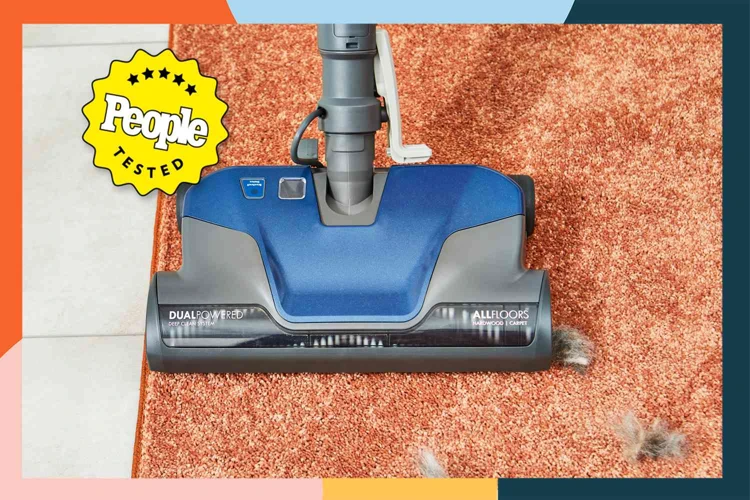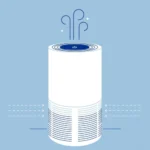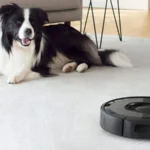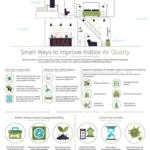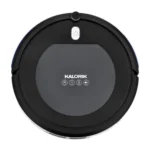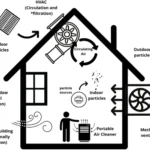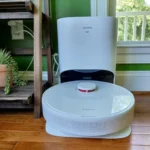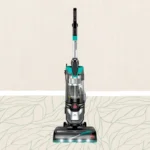As pet owners, we always want the best for our furry companions. However, as much as we love them, they tend to leave behind a lot of fur, dander, and allergens that can affect our air quality and overall health. Enter the HEPA filter. This advanced filtration system has become a staple in smart vacuum cleaners and is a must-have for pet owners. But what is HEPA filtration and how does it work? In this article, we’ll dive into the world of HEPA filters, why they’re crucial for pet owners, the benefits of using them in smart vacuums, and the top HEPA-filtered smart vacuum cleaners on the market.
What is HEPA Filtration and How Does it Work?
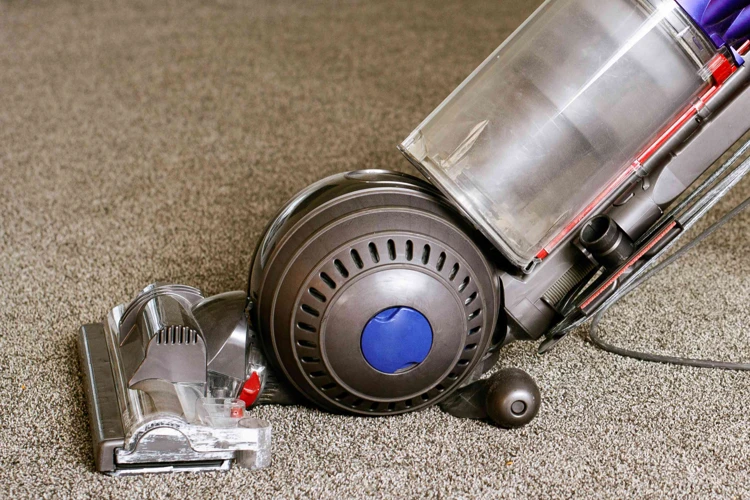
HEPA filtration is a type of air filter used in various industries, including the medical field, food industry, and home appliances. HEPA stands for High-Efficiency Particulate Air. It is an advanced filtration system that captures small particles that conventional filters can’t filter out. Generally, filters that capture particles as small as 0.3 microns in diameter are considered to be HEPA filters. This means that HEPA filters can capture dust, pollen, allergens, pet dander, and other small particles in the air.
A HEPA filter is a type of mechanical air filter that captures tiny particles in the air through a dense web of fibers. HEPA filters come in various sizes and shapes, from handheld filters to large air-purifying systems. These filters are made up of several layers of pleated filter media that trap airborne particles, such as dust, pollen, smoke, and other pollutants. HEPA filters work by forcing air through the layers, and the dense fibers trap unwanted particles.
The way a HEPA filter works is by using a combination of diffusion, interception, and impaction. The filter captures tiny particles as they pass through the media. The HEPA filter works by forcing the air through several layers of dense filter media, which trap particles, and the clean air then passes through the filter and back into the room. This way, the filter traps airborne contaminants, including pet dander and hair, that can cause allergies and other respiratory problems.
There are different types of HEPA filters: True HEPA, HEPA-like, and HEPA-Type. True HEPA filters are the most efficient, with the ability to capture 99.97% of particles as small as 0.3 microns. HEPA-like filters capture particles as small as 2 to 5 microns, and are less expensive than true HEPA filters. HEPA-Type filters are the most basic type, and can only capture particles as small as 10 microns. While these filters are effective in filtering out visible particles, they are not efficient in eliminating microscopic allergens and pollutants in the air.
HEPA filtration is a must-have for pet owners looking to improve their indoor air quality. It is especially important to consider HEPA filtration in smart vacuum cleaners as it can help with better air quality as well as efficient pet hair cleaning. Smart vacuums with HEPA filtration can help reduce pet dander and allergens in the air while improving overall air quality. Using a smart vacuum cleaner with a HEPA filter will not only keep your home clean but also contribute to your and your pet’s well-being.
[Link: /hepa-filtration-home-air-quality/]What is a HEPA filter?
When it comes to keeping our homes clean, there are a variety of tools at our disposal. However, for pet owners, the task of maintaining a clean home can be particularly challenging. Pet dander and hair can easily accumulate on floors and furniture, making it tough to keep allergens and irritants at bay. This is where HEPA filtration comes in. HEPA filters are a must-have feature in smart vacuum cleaners designed for pet owners. These filters work by trapping small particles of pet dander and hair while allowing clean air to flow back into the room. Let’s learn more about what HEPA filters are and how they work. To learn about the benefits of using a smart vacuum cleaner with HEPA filtration for pet owners, check out our article on Benefits of Smart HEPA Vacuum.
How does a HEPA filter work?
A HEPA filter is an essential component of a smart vacuum cleaner, especially for pet owners. It is designed to trap and prevent tiny particles, including pet dander, pet hair, and pet allergens from being released back into the air.
But how is a HEPA filter able to do this?
Firstly, a HEPA filter is made up of multiple layers of extremely fine mesh that can trap even the tiniest of particles. The mesh is made up of randomly arranged fibers and includes a mat of very fine glass fibers that are tightly woven together.
When the air passes through the HEPA filter, the fibers trap the particles at various distances from the filter, meaning that it stops particles that are both larger and smaller than the size of the mesh. In order to qualify as a true HEPA filter, it must be able to capture at least 99.97% of particles that are 0.3 microns.
To put this into perspective, the average diameter of human hair is typically around 70 micrometers, or 70,000 microns, which is over 200,000 times larger than 0.3 microns. In fact, particles of 0.3 microns are so small that they are invisible to the naked eye.
Thus, having a HEPA filter in a smart vacuum cleaner is important for pet owners as it can ensure that pet dander, hair, and allergens are captured and trapped within the vacuum instead of being released back into the air.
For those who might be interested in a further comparison between HEPA filtration and standard filtration, it may be useful to read our article on HEPA Filtration vs. Standard Filtration. Additionally, if you would like to learn more about HEPA filtration in smart vacuums and their benefits, you can also check out our article on HEPA Filtration in Smart Vacuums.
Having a HEPA filter does not only benefit pet owners, but it is also a good way of keeping the environment free from harmful particles, as they prevent the spread of allergens and improve air quality. Read our article on HEPA Filtration: Environmentally Friendly? to learn more about this.
There are also some myths surrounding HEPA filtration that need debunking. You can read our article on HEPA Filtration Myths Debunked to learn more.
In the next section, we will discuss in more detail why having HEPA filtration is important for pet owners.
| Pros | Cons |
| Traps 99.97% of particles 0.3 microns or larger | May require more frequent filter replacements due to clogging |
| Improves air quality by preventing the release of harmful particles back into the air | May increase the cost of the vacuum cleaner |
| Effectively captures pet dander, hair, and allergens | The vacuum cleaner may need to work harder to suck up air through the dense filter, reducing suction power |
Types of HEPA filters
HEPA filters come in different types depending on their construction, and each has its benefits and downsides. Here are some of the common types of HEPA filters:
- True HEPA filters: These are the most common type of HEPA filters, and they can remove up to 99.97% of air particles that are as small as 0.3 microns. They are efficient in trapping pet dander, hair, and other allergens.
- HEPA-type filters: These are filters that look like HEPA filters, but they don’t meet the minimum standards for HEPA filtration. They are cheaper than true HEPA filters, but they are not as effective in removing small particles.
- Washable HEPA filters: These filters are designed to last longer and cut on replacement costs. They are made of foam and can be washed and reused. They are efficient in removing dust and pet hair but not as effective as True HEPA filters in removing allergens.
- Permanent HEPA filters: These filters can last up to five years, and they are more expensive compared to other types of HEPA filters. They are efficient in removing dust and pet hair, but not as effective in removing allergens compared to True HEPA filters.
When choosing a smart vacuum cleaner with a HEPA filter for pet owners, it’s essential to consider the type of filter the vacuum uses. A True HEPA filter is the gold standard for filtration and is the recommended filter for pet owners with allergies or respiratory issues. However, if you’re looking to save some money, washable or permanent HEPA filters may be more economical in the long run.
It’s important to note that proper maintenance of your smart vacuum cleaner’s HEPA filter is crucial for effective filtration. Without proper maintenance, the filter will get clogged over time, becoming less effective in capturing pet dander, hair, and allergens. You can read more about HEPA filter maintenance in our article on smart vacuum maintenance.
Why is HEPA Filtration Important for Pet Owners?
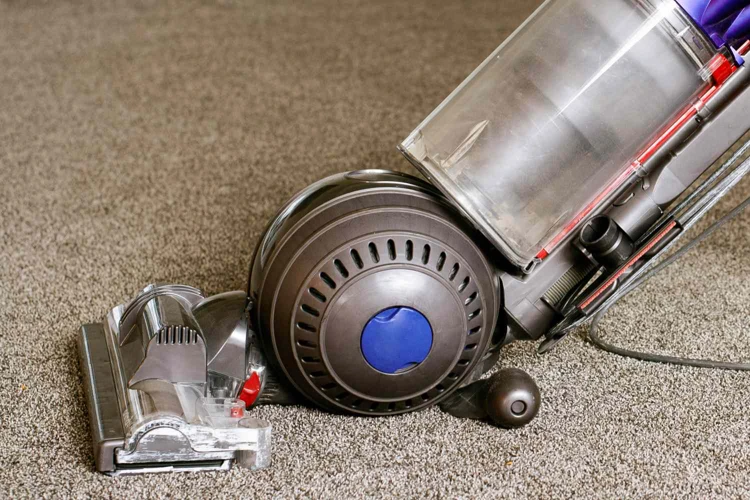
Having pets in the house brings so much joy and companionship, but it also comes with added responsibility of keeping your home clean and free from pet hair, dander, and allergens. This is where HEPA filtration plays a vital role for pet owners.
Pet Dander: Animal dander refers to tiny flakes of skin that pets shed regularly. These particles can cause severe allergic reactions in humans and can trigger asthma symptoms. Pet dander can also stick to surfaces and circulate in the air, making it imperative to clean effectively. With a smart vacuum cleaner equipped with HEPA filtration, pet owners can efficiently capture even the smallest particles of dander, leaving the air cleaner and easier to breathe.
Pet Hair: Pet hair can be a nuisance, especially for those who have allergies. Pet hair can quickly collect on floors, furniture, and other surfaces throughout the house. Standard vacuum cleaners can struggle to pick up pet hair, but vacuums with HEPA filtration are designed to capture even the tiniest pet hair, making it easier to maintain a hair-free home.
Pet Allergens: For people who suffer from pet allergies, keeping the air clean and free from allergens is essential. Pet allergens can float in the air and come into contact with humans, causing respiratory issues, skin rashes, and other allergic symptoms. HEPA filters trap these microscopic allergens and prevent them from recirculating back into the air, giving relief to allergy sufferers.
Pet owners need to consider the importance of HEPA filtration when choosing a smart vacuum cleaner. A vacuum with proper HEPA filtration can help to maintain a clean and allergen-free home for both pets and their owners. For more information on smart vacuum cleaners with HEPA filtration, check out this link. If you or someone in your household suffers from allergies, then learn more about the benefits of HEPA filtration for allergies at link.
Pet Dander
As a pet owner, you may love the cuddles and kisses from your furry friends, but what you may not love is the pet dander they leave behind. Pet dander consists of tiny skin flakes, hair, saliva, and urine particles that can easily become airborne, leading to allergic reactions and respiratory issues. These microscopic allergens can linger in your home’s air and settle on your furniture, making it difficult to breathe in your own home. That’s why having a vacuum cleaner with HEPA filtration, designed to capture even the tiniest of pet dander particles, is a must-have feature for pet owners. Let’s dive deeper into what pet dander is and why it’s essential to eliminate it from your home.
Pet Hair
As much as we love our furry friends, their shedding can be a hassle to clean up, especially if you have carpets or upholstered furniture. This is where a HEPA filter can come in handy for pet owners. Let’s take a closer look at how HEPA filtration can help with pet hair.
HEPA filters have a fine mesh that can trap pet hair and prevent it from circulating in the air. This is particularly important for pet owners who have allergies, as pet hair and dander in the air can trigger allergic reactions. By using a smart vacuum cleaner with HEPA filtration, pet owners can ensure that the air in their home is clean and free of pet hair and dander.
Not all smart vacuum cleaners are created equal when it comes to pet hair removal. Some models may have stronger suction power, while others may have better brushes for picking up hair. Here are some key features to look for when choosing a smart vacuum cleaner for pet hair:
| Feature | Description |
|---|---|
| Suction Power | A strong suction power is important for picking up pet hair from carpets and upholstery. |
| Brushes | A rotating brush can help dislodge pet hair from carpets, while a rubber brush can be effective for picking up hair from hard floors. |
| Capacity | If you have multiple pets or shedding is particularly heavy, you’ll want a smart vacuum cleaner with a large capacity to avoid having to empty it frequently. |
| Filter | In addition to a HEPA filter, some smart vacuum cleaners for pet hair come with a pre-filter that traps larger debris, such as pet hair, before it reaches the HEPA filter. |
With these features in mind, here are some of the top smart vacuum cleaners with HEPA filtration for pet hair:
1. iRobot Roomba i7+: This robot vacuum cleaner has strong suction power and a high-efficiency filter that can capture 99% of pet allergens. It also has rubber brushes that are ideal for picking up pet hair from hard floors.
2. Shark IQ Robot Self-Empty XL RV1001AE: This robot vacuum cleaner has a self-emptying base, making it ideal for pet owners who don’t want to empty their vacuum cleaner as often. It also has a high-efficiency filter that can capture pet hair and dander.
3. Eufy RoboVac 30C: This robot vacuum cleaner has a slim design that allows it to fit under furniture and a maximum suction power of 1500Pa. It also comes with boundary strips that allow pet owners to keep the vacuum cleaner away from areas where their pets eat or sleep.
Pet Allergens
Pet allergies are a major concern for many pet owners, with symptoms ranging from sneezing and watery eyes to coughing and difficulty breathing. The main culprit behind these allergies is pet dander – tiny flakes of skin shed by animals – as well as pet hair and other irritants that can accumulate in a home.
What are pet allergens?
Pet allergens are microscopic particles that are shed by animals, including cats, dogs, and even birds. These particles can be found in pet hair, skin, saliva, and urine, and can cause allergic reactions in humans.
How do pet allergens affect humans?
When pet allergens are inhaled or come into contact with the skin, they can trigger an immune response in humans, leading to symptoms such as sneezing, runny nose, watery eyes, itching, and even asthma attacks in some individuals.
How can HEPA filtration help with pet allergens?
HEPA filtration is designed to capture and trap even the smallest particles, including pet allergens. By using a vacuum cleaner with HEPA filtration, pet owners can effectively remove pet hair, dander, and other irritants from their homes, reducing the risk of allergic reactions and improving air quality.
To illustrate the effectiveness of HEPA filtration in removing pet allergens, we have compiled a table comparing the particle sizes of various substances commonly found in households:
| Substance | Particle size |
|———–|————–|
| Human hair | 30 – 120 microns |
| Pet hair | 2.5 – 10 microns |
| Pollen | 10 – 100 microns |
| Dust mite allergens | 0.5 – 50 microns |
| Pet dander | 0.1 – 25 microns |
| Bacteria | 0.3 – 60 microns |
| Mold spores | 10 – 30 microns |
| Viruses | 0.02 – 0.3 microns |
As shown in the table, pet dander ranges in size from 0.1 to 25 microns, making it one of the smallest particles on the list. HEPA filtration is able to capture particles as small as 0.3 microns, making it highly effective for removing pet allergens from the air.
By investing in a smart vacuum cleaner with HEPA filtration, pet owners can create a cleaner and healthier living environment for themselves and their pets.
Benefits of Using HEPA Filtration in Smart Vacuum Cleaners for Pet Owners
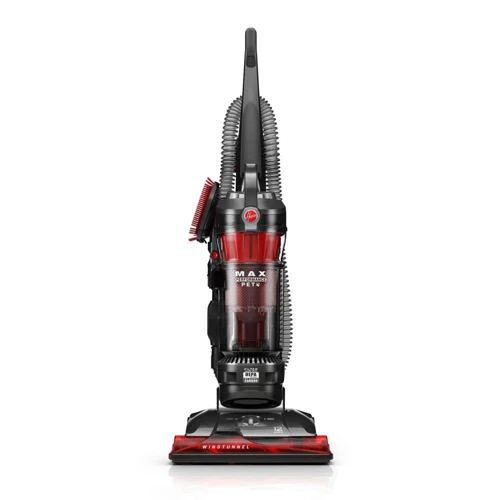
Pet owners know that keeping up with their furry friends’ hair and dander can be a never-ending task. But with smart vacuum cleaners equipped with HEPA filtration, pet owners can enjoy a clean home without constantly worrying about the pesky allergies and odors that come with pet ownership.
Improved Air Quality
HEPA filtration is a must-have for pet owners because it helps improve indoor air quality. Pet dander and hair can be detrimental to air quality if not properly cleaned up, especially for those with allergies or respiratory issues. HEPA filters can trap smaller particles, ensuring that only clean air is released back into the room.
Effective Pet Hair Removal
Pet hair is a common issue that pet owners face. It can be tough to remove from carpets and furniture, and can even cause clogs in vacuum cleaners. However, HEPA-equipped vacuum cleaners are designed to work more efficiently and effectively, with specialized brushes and suction power that can easily remove stubborn pet hair from any surface.
Reduced Pet Allergens and Odors
For many pet owners, allergies to their pets can be a real issue. Even for those without allergies, persistent pet odors can be a nuisance. HEPA filtration can capture microscopic allergens such as pet dander, pollen, and dust mites, effectively reducing allergens in the air. Additionally, some smart vacuums with HEPA filtration come with a sealed system that prevents pet odors from escaping the vacuum, resulting in a fresher, cleaner home.
HEPA filtration is a game-changer for pet owners, providing cleaner air, efficient pet hair removal, and reduced allergens and odors. If you’re a pet owner looking for a smart vacuum cleaner that can keep up with your furry friend, be sure to consider HEPA filtration when making your purchase.
Improved Air Quality
As pet owners, we all want to breathe clean and fresh air in our homes. Unfortunately, pets shed dander and hair that can circulate through the air, causing allergies or respiratory issues. This is where HEPA filtration comes in. By removing even the smallest particles from the air, a smart vacuum cleaner with HEPA filtration can significantly improve the air quality in your home. Let’s take a closer look at how this technology works and how it can benefit pet owners.
Effective Pet Hair Removal
HEPA filtration is an important feature to look for in a smart vacuum cleaner for pet owners. Pet hair is notoriously difficult to clean up and can lead to respiratory issues if not addressed properly. Here’s how HEPA filtration can help with effective pet hair removal.
HEPA Filtration Traps Fine Pet Hair
HEPA filters capture microscopic particles, including pet hair, that other filters may miss. The filter’s dense mesh traps fine pet hair and prevents it from being released into the air, which can be helpful for pet owners who suffer from allergies. When shopping for a smart vacuum cleaner, look for one with a high-efficiency HEPA filter for the best pet hair removal.
To further enhance pet hair removal, some smart vacuum cleaners have specialized brushes and rollers designed specifically for pet hair. These brushes pick up loose hair from carpets, furniture, and other surfaces and deposit them into the vacuum’s dustbin.
Here’s a comparison of some top smart vacuum cleaners for pet owners with HEPA filtration and specialized brushes for pet hair removal:
| Smart Vacuum Cleaner | Specialized Pet Hair Brush/Roller |
|---|---|
| iRobot Roomba i7+ | Dual Multi-Surface Rubber Brushes with high-efficiency filter |
| Shark IQ Robot Self-Empty XL RV1001AE | Self-cleaning brush roll with Anti-Allergen Complete Seal Technology® |
| Eufy RoboVac 30C | Triple-Filter System with two side brushes and one main brush |
Regular Cleaning is Crucial
To ensure optimal performance, it’s important to clean the vacuum’s brushes and filters regularly. Check the manufacturer’s instructions for recommended cleaning intervals. Neglecting to clean the filters and brushes can reduce the efficiency of the vacuum cleaner, leading to a decrease in pet hair removal.
Proper Use of Filters
HEPA filters are not indestructible, and using them improperly can lead to damage. Make sure to handle the filters with care, following the manufacturer’s instructions for proper installation and removal. Some filters may need to be cleaned or replaced after a certain number of uses or months of use, depending on the manufacturer’s recommendations. Keep extra filters on hand so that you can easily replace them as needed.
HEPA filtration is an essential feature for pet owners when choosing smart vacuum cleaners. It helps to capture fine pet hair and prevent it from being released into the air, which can lead to respiratory issues. Look for specialized brushes and rollers to further enhance pet hair removal. Regular cleaning and proper use of filters are crucial to maintain the vacuum’s performance.
Reduced Pet Allergens and Odors
By using a smart vacuum cleaner with HEPA filtration, pet owners can benefit from reduced pet allergens and odors in their homes. This is a significant advantage for individuals who suffer from pet allergies or who have guests that may be allergic.
Reduced Pet Allergens: Pet allergens, such as pet dander and saliva, can be found in the air and on surfaces throughout a home. When these allergens are inhaled or come into contact with the skin, they can cause an allergic reaction. HEPA filtration is highly effective in trapping these allergens and preventing them from circulating throughout the home. By using a smart vacuum cleaner with HEPA filtration, pet owners can significantly reduce the amount of pet allergens in their homes.
Reduced Pet Odors: In addition to allergens, pets can also produce odors that can linger in a home. These odors can be caused by pet urine, feces, and even the natural oils in a pet’s skin. HEPA filtration can help to reduce these odors by trapping and removing particles from the air. Additionally, smart vacuum cleaners with HEPA filtration often come with additional features such as odor-absorbing filters or specialized cleaning modes to target pet-specific messes.
To illustrate the effectiveness of HEPA filtration in reducing pet allergens and odors, consider the following table:
| Regular Vacuum Cleaner | Smart Vacuum Cleaner with HEPA Filtration | |
|---|---|---|
| Pet Allergens | Traps some allergens, but may stir up and spread others | Traps 99.97% of allergens, preventing them from circulating throughout the home |
| Pet Odors | May temporarily mask odors, but they can return quickly | Traps and removes particles from the air, reducing pet odors |
Incorporating a smart vacuum cleaner with HEPA filtration into your cleaning routine can significantly improve the air quality in your home and reduce the presence of pet allergens and odors. By considering the factors outlined in this article and selecting a model that best suits your needs, pet owners can take the first step towards a cleaner, healthier home.
Factors to Consider When Choosing a Smart Vacuum Cleaner with HEPA Filtration for Pets
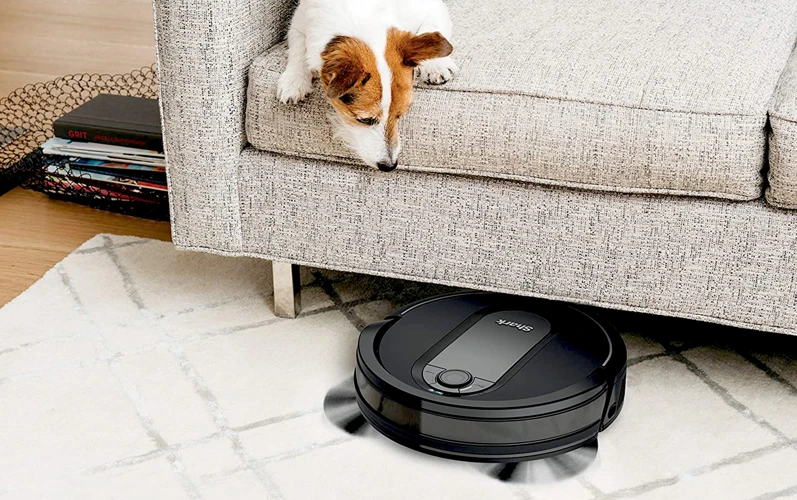
When choosing a smart vacuum cleaner with HEPA filtration for pets, there are several factors to consider to ensure that you make the right choice for your home and your furry friends.
First, you should consider the size of your house. If you live in a smaller home or apartment, a compact vacuum might be sufficient. But for larger homes, a vacuum with a larger dustbin and longer battery life would be more convenient. The size of your home will also determine the charging time required for the vacuum.
Another important factor to consider is the type of flooring in your house. If you have carpets, you would need a vacuum with strong suction power and a motorized brush roll that can easily pick up pet hair embedded deep in the carpets. For hard floors, a vacuum with a good suction power and a soft brush roll would be more suitable.
The type of pet you have is another important consideration. If you have a long-haired pet, you would need a vacuum with a larger dustbin and a more powerful suction to pick up all the pet hair. Likewise, if you have a pet that sheds a lot, a vacuum with a larger dustbin and HEPA filtration would be essential to prevent the spread of allergens.
You should also consider the overall design of the vacuum. A vacuum with a slim design and low profile would be better for navigating under furniture and tight spaces. Additionally, a vacuum with a larger dustbin would require less frequent emptying, which is ideal for pet owners who don’t have a lot of spare time.
When purchasing a vacuum with HEPA filtration for pets, it’s important to take into account all of these factors to ensure that you make the right choice for your home and pet’s needs. By doing so, you’ll be able to enjoy a cleaner and healthier home environment for you and your furry friends.
The Size of Your House
When it comes to purchasing a smart vacuum cleaner with HEPA filtration for your pet-filled home, one of the most important factors to consider is the size of your living space. The size of your house can greatly affect how efficient a vacuum cleaner will be in cleaning your floors and improving air quality. It’s important to take the time to assess your living space and determine which type of smart vacuum cleaner will work best for you. Let’s take a closer look at why the size of your house matters and what you should keep in mind when choosing a vacuum cleaner with HEPA filtration.
The Type of Flooring in Your House
When choosing a smart vacuum cleaner with HEPA filtration for pet owners, it’s important to consider the type of flooring in your house. Different types of floors require different types of cleaning and some smart vacuum cleaners work better on certain types of flooring than others.
Here are some types of flooring and the best vacuum cleaners for them:
- Hardwood floors: Hardwood floors require gentle cleaning to avoid scratches and damage. Look for smart vacuum cleaners with soft bristle brushes that won’t damage your floors. The Eufy RoboVac 30C is a great option for hardwood floors as it has a brushless motor that won’t scratch the surface of your floors.
- Carpeted floors: Carpets can be a challenge to clean as they tend to trap pet hair and dander, especially in long-pile carpets. Smart vacuum cleaners with strong suction power are ideal for carpeted floors. The Shark IQ Robot Self-Empty XL RV1001AE is a powerful vacuum cleaner that can handle carpets with ease.
- Tile floors: Tile floors are easy to clean but require a smart vacuum cleaner that can handle the grout lines. The iRobot Roomba i7+ is a great option for tile floors as it has a high-efficiency filter that traps pet hair and dander even in the small spaces between tiles.
Consider the type of flooring in your house when choosing a smart vacuum cleaner with HEPA filtration for pet owners. Select a vacuum cleaner that works best for your specific flooring type to ensure effective cleaning and the maintenance of your floors.
The Type of Pet You Have
When considering which smart vacuum cleaner with HEPA filtration to purchase as a pet owner, it’s important to take into account the type of pet you have, as different animals have different types of hair and dander that require varying levels of filtration. Here’s a breakdown of what to look for:
| Pet Type | Recommendation |
|---|---|
| Dogs | For dog owners, it’s important to consider the breed and size of your furry friend. Larger dogs with longer hair may require a vacuum with more powerful suction and a larger dustbin for holding pet hair, while smaller dogs with short hair may not require as much suction power. |
| Cats | Cats are known for shedding a lot, especially during the summer months. Look for a vacuum cleaner with a motorized brush that can effectively pick up cat hair from furniture, carpets, and floors. Additionally, consider a vacuum with a lower noise level to avoid spooking your feline friend! |
| Birds | For pet bird owners, a vacuum with HEPA filtration is essential as birds have sensitive respiratory systems that can be easily irritated by dust and other airborne particles. Look for a vacuum with a gentle suction mode and a crevice tool for getting into hard-to-reach places like bird cages and perches. |
| Rabbits | Rabbit owners should consider a vacuum with strong suction power to pick up hay and fur that can accumulate on the floor and in their enclosure. Additionally, look for a vacuum that can easily maneuver around furniture and has a slim profile to get under tight spaces. |
| Hamsters/Gerbils | While small rodents like hamsters and gerbils don’t shed much hair, they do produce a lot of dust from their bedding and food. Look for a vacuum cleaner with specialized filters that can effectively trap these small particles to avoid respiratory irritation. Additionally, consider a vacuum with a detachable handheld component for cleaning the inside of cages and exercise balls. |
No matter what type of pet you have, it’s important to choose a vacuum cleaner with HEPA filtration that can effectively trap pet hair, dander, and other allergens to keep your home clean and safe for both you and your furry friend.
Top Smart Vacuum Cleaners with HEPA Filtration for Pet Owners
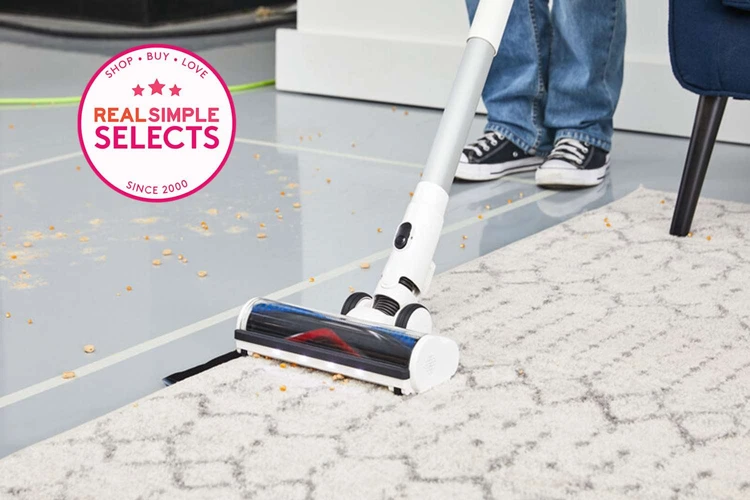
One of the best ways for pet owners to keep their homes clean and air quality high is by investing in a smart vacuum cleaner with HEPA filtration. Luckily, there are many options available on the market to choose from.
1. iRobot Roomba i7+
This powerful smart vacuum cleaner from iRobot uses HEPA filtration to capture 99.97% of pet hair, dander, and dust. It also features advanced mapping technology and voice control capabilities, making it a convenient and efficient choice for any pet owner.
2. Shark IQ Robot Self-Empty XL RV1001AE
The Shark IQ Robot vacuum cleaner also uses HEPA filtration and has the added benefit of a self-emptying dustbin, making it a low-maintenance option for busy pet owners. It also has powerful suction and can easily handle pet hair and dander.
3. Eufy RoboVac 30C
The Eufy RoboVac 30C is another popular smart vacuum cleaner for pet owners. It uses triple-layer HEPA filtration to capture even the smallest pet allergens and has powerful suction to remove pet hair from floors and carpets. It also features voice control and is compatible with both Alexa and Google Assistant.
When choosing the right smart vacuum cleaner for your home and pets, it is important to consider factors such as the size of your house, the type of flooring, and the type of pet you have. Additionally, it is important to properly maintain your vacuum cleaner’s HEPA filter through regular cleaning and replacement to ensure it continues to function effectively.
1. iRobot Roomba i7+
Are you tired of constantly having to vacuum up pet hair and dander from your floors, furniture, and clothing? Look no further than the iRobot Roomba i7+! This smart vacuum cleaner with HEPA filtration is a must-have for pet owners looking for an effective and efficient way to keep their homes clean. The iRobot Roomba i7+ features a patented 3-stage cleaning system that loosens, lifts and suctions pet hair and other debris, leaving your floors spotless. Its advanced filtration system captures 99% of pet allergens, dust and dirt, ensuring that the air in your home is clean and fresh. Let’s dive deeper into the features and benefits of the iRobot Roomba i7+ for pet owners.
2. Shark IQ Robot Self-Empty XL RV1001AE
One of the best smart vacuum cleaners with HEPA filtration for pet owners is the Shark IQ Robot Self-Empty XL RV1001AE. This vacuum cleaner has a self-emptying feature that empties the dustbin into an allergen-blocking bag, ensuring that pet dander and other allergens are not released back into the air. This vacuum cleaner is also equipped with advanced mapping, allowing it to clean efficiently and thoroughly.
Here are some key features of the Shark IQ Robot Self-Empty XL RV1001AE:
- Powerful suction: The vacuum cleaner has a powerful suction, which is perfect for removing pet hair and other debris from carpets, rugs, and hard floors.
- Self-cleaning brushroll: The brushroll is designed to remove pet hair and other debris without getting tangled. It also has a self-cleaning feature, which removes pet hair and other debris that gets wrapped around the brushroll.
- Multiple cleaning modes: The vacuum cleaner has three cleaning modes – suction only, brushroll only, and both suction and brushroll – which can be used to clean different types of surfaces and debris.
- Large dustbin: The dustbin is large enough to hold a lot of pet hair and other debris, which means you won’t have to empty it frequently.
- Advanced mapping technology: The vacuum cleaner uses advanced mapping technology to create a map of your home, which allows it to clean efficiently and thoroughly. It also has a feature that allows you to create virtual walls to block off areas you don’t want the vacuum cleaner to go.
The Shark IQ Robot Self-Empty XL RV1001AE is a great choice for pet owners who want a smart vacuum cleaner with HEPA filtration. Its self-emptying feature, powerful suction, and advanced mapping technology make it an effective and efficient cleaner for homes with pets.
3. Eufy RoboVac 30C
Eufy RoboVac 30C is a smart vacuum cleaner that offers a powerful suction and efficient HEPA filtration system for pet owners. Here are some of its top features:
- BoostIQ Technology: This feature enables the vacuum cleaner to automatically increase its suction power on surfaces that require extra cleaning. This means that the RoboVac 30C can effectively clean pet hair and dander from carpets, rugs, and other surfaces.
- Boundary Strips: For pet owners who want to keep the vacuum cleaner away from certain areas of their home, such as pet bowls or litter boxes, the RoboVac 30C comes with boundary strips that allow you to establish no-go zones.
- Slim Design: At only 2.85 inches tall, the RoboVac 30C can fit under furniture and other hard-to-reach areas, making it easier to clean pet hair and dander from every corner of your home.
- Triple-Filter System: The RoboVac 30C uses a triple-filter system that includes a pre-filter, a high-performance filter, and a HEPA filter, which can effectively capture 99% of pet hair, dander, and allergens as small as 0.3 microns.
- Wi-Fi Connectivity: With the EufyHome app, you can control the RoboVac 30C from your phone and customize cleaning schedules, cleaning modes, and more.
The Eufy RoboVac 30C is an excellent option for pet owners who want a smart vacuum cleaner with HEPA filtration that can effectively clean pet hair and dander from their home. Its powerful suction, slim design, and advanced features make it a great investment for maintaining a clean and healthy living space for you and your furry friend.
Tips for Maintaining Your Smart Vacuum Cleaner’s HEPA Filters
Maintaining your smart vacuum cleaner’s HEPA filters is crucial for ensuring that the vacuum is working at its optimum best. Here are some tips to help you maintain your HEPA filters:
Regular Cleaning: In order for your HEPA filter to perform effectively, it is essential to clean it regularly. You can check the manufacturer’s instructions on how often and how to clean the filter. Typically, cleaning the filter once a month is a sufficient frequency. To clean the filter, remove it from your vacuum and then gently brush it off to remove any accumulated dust, dirt or debris. If you have a washable HEPA filter, rinse it off with water and let it dry completely before reinstalling it in your vacuum.
Replacement: HEPA filters have a lifespan, and it’s essential to replace them once they have reached their maximum usage level. The lifespan of a HEPA filter varies depending on the manufacturer’s specifications and the frequency of use. Most manufacturers recommend replacing your HEPA filters every six months to a year.
Proper Use of Filters: Another essential tip for maintaining your smart vacuum cleaner’s HEPA filters is to ensure that you use them correctly. Always ensure that the filter is properly fitted before starting the vacuum. Additionally, ensure that you place the filter back in its original position in the vacuum after cleaning or replacing it.
Maintaining your vacuum’s HEPA filters is crucial for ensuring optimum performance and air quality. By following these tips, you can extend the lifespan of your filter, prevent malfunctions, and keep your vacuum functioning at its best. Remember to consult your vacuum’s manual for specific instructions on how to clean and replace its HEPA filter.
Regular Cleaning
One of the most important things to keep in mind when it comes to maintaining your smart vacuum cleaner’s HEPA filters is the need for regular cleaning. Over time, pet hair, dander, and other debris can clog the filters, reducing their effectiveness and potentially causing damage to your vacuum. But how often should you be cleaning your filters, and what’s the best way to do it? Let’s explore some tips and tricks for keeping your smart vacuum cleaner’s HEPA filtration system in top condition.
Replacement
To ensure the efficiency of your smart vacuum cleaner’s HEPA filtration, it’s essential to replace the filters regularly. Over time, the filter’s surface area becomes filled with dirt, dander, and other debris, which can negatively impact the filtration process. It’s recommended to replace the filters after a certain period or when they become visibly dirty or damaged.
The frequency of filter replacement depends on several factors, such as the frequency of use, the size of your home, and the number of pets you have, among others. It’s best to refer to your vacuum cleaner’s manufacturer guidelines for specific recommendations. Typically, you can expect to replace the filters every 3 to 6 months, though it could be shorter or longer depending on the vacuum and usage.
It’s crucial to choose high-quality replacement filters made for your specific vacuum model to ensure maximum filtration efficiency. Some smart vacuum cleaner models come with a filter replacement indicator that alerts you when it’s time to replace the filters. If your vacuum has this feature, it’s essential to pay attention to it to avoid reduced filtration effectiveness that could lead to the proliferation of allergens and odors in your home.
How to replace HEPA filters in a smart vacuum cleaner?
Replacing HEPA filters in a smart vacuum cleaner is a straightforward process. First, refer to your vacuum’s instructions to identify the type of filter you need and how to remove and replace it. The process typically involves opening the filter compartment, removing the old filter, and inserting the new filter.
It’s essential to remember to replace the filter as a complete set, inclusive of the pre-filter if it has one. Ensure everything is tightly sealed to avoid dust and debris escaping the filter compartment. After replacing the filter, it’s an excellent idea to clean the vacuum’s brushes, rollers, and other parts that come into contact with pet hair and dander. Clean filters and well-maintained vacuums translate into a healthier home environment for you and your furry friend.
| When to replace filters | Every 3 to 6 months (guideline) | When visibly dirty or damaged | When indicated by the vacuum cleaner’s filter replacement alerts |
|---|---|---|---|
| Importance of using high-quality replacement filters | Ensures maximum filtration efficiency | ||
| Filter replacement process | Refer to the vacuum cleaner’s instructions to identify the filter, remove the old filter, and insert the new filter as a complete set. Clean and maintain other vacuum parts and accessories, e.g., brushes and rollers, for optimum performance. | ||
Proper Use of Filters
One important factor to consider when using a smart vacuum cleaner with HEPA filtration for pets is the proper use of filters. Mishandling or misuse of filters can affect their effectiveness and can even damage the vacuum cleaner. Here are some tips for proper filter use:
| Tips | Explanation |
|---|---|
| Install the filter correctly | Make sure to properly insert the filter according to the manufacturer’s instructions. Misalignment or improper installation can cause dust and other particles to bypass the filter |
| Replace the filter periodically | HEPA filters need to be replaced regularly to maintain their effectiveness. Check with the manufacturer on the recommended replacement schedule for your specific model. |
| Clean the filter frequently | HEPA filters tend to clog over time, reducing their filtering efficiency. To maintain proper filtration performance, regularly clean the filter according to the manufacturer’s instructions. Some filters can be vacuumed, while others need to be washed or replaced entirely. |
| Avoid washing filters unnecessarily | While cleaning HEPA filters is important, washing them too often can lead to their deterioration. Many HEPA filters have a limited lifespan and washing them regularly can cause them to degrade faster. |
| Use only genuine filters | Using non-genuine or cheap filters can cause damage to the vacuum cleaner or cause the filter to disintegrate over time. Always choose genuine or recommended filters for your specific vacuum cleaner model. |
| Store filters properly | When not in use or during replacement, make sure to store the filter in a safe and dry place, out of reach of pets or children. |
By following these tips, pet owners can ensure that their smart vacuum cleaner with HEPA filtration is working at its best, providing clean and healthy air in their home while keeping pet hair and dander at bay.
Conclusion
In conclusion, if you’re a pet owner, having a smart vacuum cleaner with HEPA filtration is a must-have feature. HEPA filters can effectively remove pet hair, dander, and allergens from the air, improving the air quality in your home. This is especially important for those who suffer from pet allergies or have respiratory issues.
By using a smart vacuum cleaner with HEPA filtration, you can also enjoy more efficient pet hair removal. These devices are designed to pick up pet hair and other debris from carpets, hardwood floors, and even furniture.
It’s important to consider the size of your house, the type of flooring you have, and the type of pet you have when choosing a smart vacuum cleaner with HEPA filtration. This will help you choose a device that’s best suited to your needs.
Some of the top smart vacuum cleaners with HEPA filtration include the iRobot Roomba i7+, Shark IQ Robot Self-Empty XL RV1001AE, and Eufy RoboVac 30C. These devices are highly efficient, easy to use, and come with advanced features that make cleaning a breeze.
When using a smart vacuum cleaner with HEPA filtration, it’s important to maintain your filters properly. This includes regular cleaning, replacement, and proper use of filters. By doing so, you can ensure that your device continues to function effectively and provides you with the best results.
In summary, a smart vacuum cleaner with HEPA filtration is essential for pet owners who want to maintain a clean and healthy home. By investing in one of these devices, you can enjoy improved air quality, efficient pet hair removal, and reduced pet allergens and odors. Consider the factors we’ve discussed when choosing a device and make sure to maintain your filters properly. This will help you get the most out of your device and keep your home clean and healthy for you and your furry friends.
Frequently Asked Questions
1. How often should I clean my HEPA filter?
You should clean your HEPA filter at least once a week, or more frequently if you have multiple pets or if your pets shed heavily.
2. What is the lifespan of a HEPA filter?
The lifespan of a HEPA filter varies depending on usage, but they usually last for about six to twelve months.
3. Can HEPA filtration completely eliminate pet allergens?
No, HEPA filtration cannot completely eliminate pet allergens, but it can significantly reduce their presence in the air and on surfaces.
4. Can all vacuum cleaners be equipped with HEPA filtration?
No, not all vacuum cleaners can be equipped with HEPA filtration. Some lower-priced or older models may not be designed to accommodate HEPA filters.
5. Do all smart vacuum cleaners with HEPA filters work on different types of flooring?
No, not all smart vacuum cleaners with HEPA filters work on different types of flooring. You should check the product specifications before purchasing to ensure compatibility with your flooring type.
6. Are HEPA filters washable or do they need to be replaced?
Some HEPA filters are washable and reusable, while others need to be replaced once they become clogged with dirt and debris. Be sure to check the manufacturer’s instructions for proper maintenance.
7. How effective are smart vacuum cleaners with HEPA filtration in removing pet hair?
Smart vacuum cleaners with HEPA filtration are highly effective in removing pet hair, as they have powerful suction and specialized brushes designed to pick up even the most stubborn pet hair.
8. Can smart vacuum cleaners with HEPA filtration help reduce pet odors?
Yes, smart vacuum cleaners with HEPA filtration can help reduce pet odors by capturing and trapping odor-causing particles in their filters.
9. How does HEPA filtration differ from standard filtration?
HEPA filtration is a more advanced type of filtration that is highly efficient in capturing small, microscopic particles, while standard filtration may not capture particles as small or as effectively.
10. Do I need to turn off my smart vacuum cleaner before cleaning the HEPA filter?
Yes, it’s important to turn off your smart vacuum cleaner before cleaning the HEPA filter to prevent damage to the filter and ensure your safety. Consult the manufacturer’s instructions for proper cleaning procedures.
